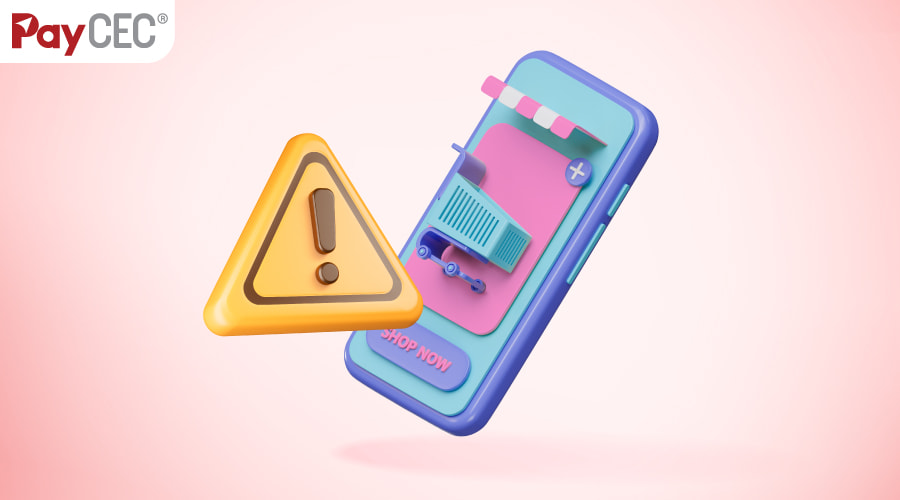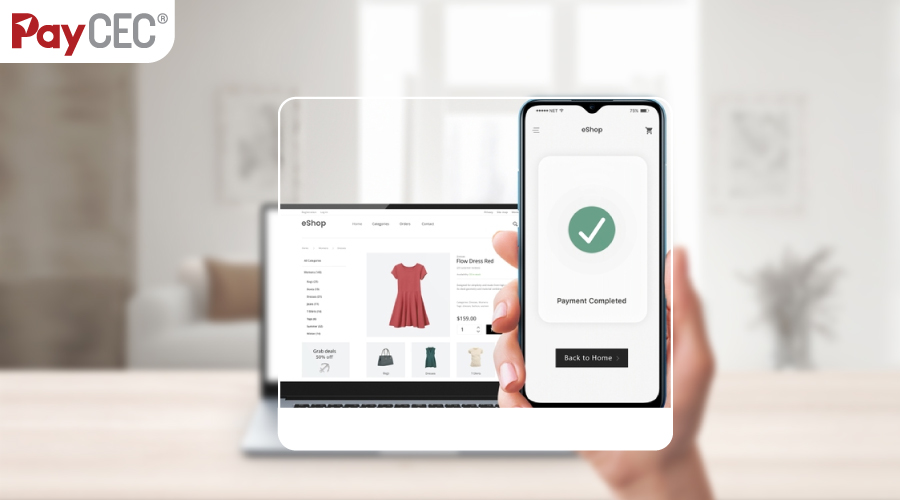- Hotline +65 6631 8332
The Future of Payment Where Fintech Payment Gateway Is Leading The Way
Wednesday, 03 Apr, 2024

This article is a part of PayCEC payment insights
Follow PayCEC - global payment gateway to get updates on the latest payment trends and ecommerce news
What's inside?
It cannot be denied that innovative technologies have been and still changing our lives in a better direction. In the business industry, financial technologies in payment gateway systems have continued to play a huge part in making online shopping much more convenient. Soon, a fintech payment gateway is expected to lead and form most of how we make purchases on the internet.
So, what is a fintech payment gateway and how can it change the way we do the shopping online in the long term? First, let’s find out how it differs from traditional payment gateway.
Normal Payment Gateway Vs. Fintech Payment Gateway
Fintech Payment Gateway Focuses On Applying Technology-Driven Solutions
A fintech (financial technology) payment gateway is a type of payment gateway for websites that uses technology-driven solutions to smooth and enhance data protection in online payment processing. These systems leverage innovative technologies to streamline payment processes, enhance security, and improve the overall efficiency of financial transactions.
Fintech payment gateway does not refer to a particular type of technology but indicates the application of new ones into the financial industry. In the current era, new technologies have added even more to the list of benefits of online payment gateways. Features such as contactless payment, internet of things, artificial intelligence, biometrics, blockchain & cryptocurrency, etc. are being widely applied and studied for deeper understanding.

Fintech payment gateways apply technology-driven solutions in processing payment transactions.
Indeed, the fintech payment gateway plays a crucial role in modernizing and digitizing the way financial transactions are conducted, offering convenience, security, and efficiency to consumers and businesses alike.
Compared to traditional payment systems, fintech payment gateways are assessed to bring back greater benefits to both the merchants and their customers.
Normal Payment Gateway Vs. Fintech Payment Gateway
A comparison between a traditional payment gateway and a payment gateway with fintech characteristics is presented in a table format:
|
Aspect |
Traditional Payment Gateway |
Fintech Payment Gateway |
|
Functionality |
|
|
|
Innovation and Flexibility |
|
|
|
User Experience |
|
|
|
Security and Compliance |
|
|
As can be seen in the table, fintech payment gateways offer enhanced functionalities, greater innovation, improved user experiences, and advanced security measures compared to traditional payment gateways. They leverage technology to provide more flexible, adaptable, and customer-centric payment solutions in the rapidly evolving fintech landscape.

The fintech payment gateway is characterized by innovation, agility, and adaptability, leveraging cutting-edge technologies such as AI, blockchain, and biometrics.
Payment Technologies Are Changing Rapidly With Financial Technology Advancements
With the support of advanced emerging technologies like the internet of things, artificial intelligence, machine learning, etc., fintech payment systems are rapidly changing the way we purchase things and experience online shopping. It is expected to shape the future of payment soon.
Particularly, financial technology enables B2B payment gateway systems to streamline payment transactions between businesses and businesses, and strengthen their collaboration by smoothly and efficiently completing payment processing on every project.
To B2C businesses, the technology makes it easier and faster for customers to complete their online purchases, leaving a good impression and increasing customer loyalty.
By customizing personalized features with artificial intelligence, blockchain, biometrics, and machine learning to deliver innovative payment solutions, businesses now can easily meet ever-changing consumer expectations and industry trends, providing businesses with flexible and adaptable payment options.
And by personalizing customer experience on the site, businesses can leverage design thinking principles and customer-centric approaches to streamline transactions, reduce friction, and improve customer satisfaction. Furthermore, the way it allows various currencies and payment methods, fintech once again enables businesses to cater to the preferences of a global and digitally savvy customer base, driving financial inclusion and expanding the payment ecosystem.
One more thing that makes fintech payment system stand out from the crowd is the way it persuades us with real data-driven insights. Fintech generates valuable data and analytics that offer insights into consumer behavior, transaction patterns, and market trends.
As technology continues to advance and consumer behavior evolves, fintech payment gateways will play a crucial role in shaping the future of payments, driving financial innovation, and fostering economic growth, making it a crucial part of your business payment system.

Fintech payment gateways embrace technological advancements including blockchain, biometrics, and machine learning to deliver innovative payment solutions.
Fintech Payment Gateways Are Crucial Parts Of Your Business Payment System
Having those financial technologies in payment gateway systems is indeed an advantage compared to traditional ones. Particularly, payment process shortening, flexibility enabling, and security enhancement are key focuses of this innovation.
Firstly, fintech-driven payment gateways can enhance the overall customer experience by offering innovative features and user-friendly interfaces, improving customer satisfaction and loyalty with seamless checkout processes, personalized payment options, and convenient payment methods.
Secondly, by supporting a wide range of payment methods compared to the traditional ones, including digital wallets, cryptocurrencies, and alternative payment options, fintech payment gateways allow online businesses to capture more sales opportunities and become more customer-friendly platforms.
Mentioning its most focused features, fintech payment gateways leverage advanced security technologies including biometrics, and artificial intelligence to protect payment data and detect fraudulent activities in real-time, reducing the risk of data breaches and financial losses for businesses.
Not only concentrating on user experience, fintech payment gateways also open businesses to customers’ insights into their behavior, transaction trends, and performance metrics, making it easier to sketch out a marketing strategy with optimized pricing.
Last but not least, as one of the most key aspects in launching a business forward, scalability and flexibility are two crucial matters a business must keep in mind when choosing the right payment gateway. For that reason, fintech payment gateways are designed to scale with businesses as they grow by offering flexible integration options, customizable features, and modular architectures that can adapt to changing business needs and evolving market trends.
Businesses can easily add new payment methods, expand into new markets, or integrate with third-party services as their requirements evolve. Indeed, how we make payments in the current era is now changing in a positive direction with the integration of technological advancements. Though there are challenges and opportunities in every change, there are also ways to get over obstacles and take advantage of chances.

Fintech has opened a payment gateway to the future of convenience and customized payment with a high-security system with biometric authentication
Challenges & Opportunities For Businesses Applying Fintech Payment Gateways
Challenges and opportunities you get when applying for a new change are inevitable, what businesses need to prepare for applying fintech payment gateways is suggested in the list below.
1. Regulatory Compliance
- Challenge: There are complex and evolving regulatory frameworks, including data protection laws, anti-money laundering (AML) regulations, and payment card industry standards (PCI DSS), which are time-consuming and costly to apply, particularly for businesses operating across multiple jurisdictions.
- Opportunity: Successfully meet all the requirements, businesses can leverage regulatory requirements as a competitive advantage by demonstrating commitments to data privacy, security, and transparency. Then they can easily build trust with customers, mitigate legal risks, and avoid penalties or fines.
2. Cybersecurity Threats
- Challenge: Fintech payment gateways are prime targets for cyberattacks, including data breaches, ransomware attacks, and phishing scams. The loss or theft of sensitive payment data can result in financial losses, reputational damage, and regulatory sanctions.
- Opportunity: Besides the safeguarding benefits, businesses can also invest in cybersecurity training and awareness programs to educate employees and customers about best practices for preventing cyber threats.
3. Market Competition
- Challenge: Obviously, the fintech landscape is highly competitive, with numerous established financial institutions, technology companies, and startups all competing to offer innovative payment solutions and capture customer loyalty.
- Opportunity: In a highly competitive marketplace, if businesses know how to differentiate themselves from the crowd by offering unique value propositions, they can leverage partnerships and collaborations with other fintech firms to expand their product offerings and reach new customer segments.
Businesses implementing fintech payment gateways must navigate regulatory complexities, safeguard against cybersecurity threats, and compete effectively in a crowded marketplace. By prioritizing regulatory compliance, enhancing cybersecurity measures, and leveraging competitive advantages, businesses can capitalize on the opportunities presented by fintech payment solutions and drive sustainable growth in the digital economy.
PayCEC - An Ideal Fintech Payment Gateway To Keep You Forward
PayCEC is a leading payment gateway solution provider that offers businesses not only their highest level of payment features but also the best customer services assisted by technical experts.
As a global fintech payment gateway, PayCEC has enough functionality, innovation and flexibility to push your businesses forward in the flat world of digitalization.
- Functionality and features: PayCEC supports various of payment methods including credit/debit cards, NFC, mobile payment, e-wallets, and more. The most well-known feature of the company is the 24-hour fast integration that enables merchants to immediately install and launch the payment system within 24 hours.
- Innovation and Flexibility: Besides payment gateway solutions, PayCEC offers features like account management, real-time risk management, payment page customizing, etc. giving businesses a full set of management tools for recording, tracking, analyzing, and reporting on their payment history.
- Security & Data Protection: PayCEC corporates with all prestigious financial institutions and regulation compliances of the world like PIC DSS, data encryption, tokenization features, fraud detection capabilities, real-time monitoring, and emerging technologies such as biometrics and behavioral analytics.
The evolution of technology, coupled with shifting consumer preferences and regulatory changes, has created a dynamic landscape for payment technologies to be more innovative and more adaptable.
The payment systems worldwide are rapidly evolving with fintech payment gateways at the forefront of the transformation. As we move forward, it's clear that these fintech solutions will continue to lead the way, offering secure, efficient, and seamless payment experiences for both businesses and their customers. By embracing these advancements, our businesses can not only drive financial conclusions but also pave the way toward a more connected and accessible global economy.
About PayCEC
PayCEC was established in response to the growing need of businesses to accept online payments more quickly and easily. In the new media era, our payment flow has evolved to work seamlessly and effectively across all platforms and devices. We pride ourselves on combining superior technology with first-class customer service.
PayCEC is a truly global payments platform that not only allows customers to get paid but also withdraws funds to their business accounts in various currencies.
We have created an open and secure payments ecosystem that people and businesses choose to securely transact with each other online and on mobile devices.
PayCEC Team
Frequently Asked Questions
What is a payment gateway in fintech?
In fintech, a payment gateway serves as the intermediary between a merchant's website or application and the bank or financial institution that processes transactions. It securely facilitates the transfer of payment information between the customer, merchant, and payment processor, ensuring that transactions are processed smoothly and securely.
Key functions of a payment gateway in fintech include:
Authorization: Verifying whether a transaction can be approved based on factors such as available funds, card validity, and fraud risk.
Encryption: Encrypting sensitive payment data, such as credit card numbers or banking details, to protect it from unauthorized access or interception.
Transaction Processing: Facilitating the movement of funds from the customer's account to the merchant's account, typically via the payment processor and banking networks.
Security and Compliance: Implementing security measures to protect against fraud and ensure compliance with industry regulations, such as the Payment Card Industry Data Security Standard (PCI DSS).
Integration: Integrating seamlessly with merchants' websites or applications, allowing customers to complete transactions without disruptions or delays.
Reporting and Analytics: Providing merchants with insights and data on transaction volumes, sales trends, and other relevant metrics to help them make informed business decisions.
Overall, payment gateways play a crucial role in enabling e-commerce and online transactions by providing a secure and reliable means of processing payments in the fintech industry.
What is a fintech payment system?
A fintech payment system refers to a digital platform or infrastructure that enables the transfer of funds and facilitates financial transactions using technology-driven solutions. These systems leverage innovative technologies with their unique features to streamline payment processes, enhance security, and improve the overall efficiency of financial transactions.
Payment Gateways: As mentioned earlier, payment gateways serve as the intermediary between merchants, customers, and financial institutions, facilitating the authorization, processing, and settlement of transactions.
Mobile Wallets: Mobile wallet applications allow users to store payment information, such as credit card details or bank account information, on their smartphones. They can then use these wallets to make purchases online or in-store, transfer money to others, and pay bills.
Peer-to-Peer (P2P) Payment Apps: P2P payment apps enable individuals to send and receive money directly to and from each other using their mobile devices. These apps often offer features such as instant transfers, split bills, and social payment options.
Blockchain and Cryptocurrency: Fintech payment systems may also incorporate blockchain technology and cryptocurrencies like Bitcoin or Ethereum to facilitate peer-to-peer transactions, cross-border payments, and digital asset transfers with enhanced security and transparency.
Contactless Payments: With the rise of NFC (Near Field Communication) technology, fintech payment systems enable contactless payments using smartphones, smartwatches, or contactless cards, providing a convenient and hygienic payment option for consumers.
APIs and Open Banking: Fintech payment systems leverage APIs (Application Programming Interfaces) to enable seamless integration with third-party services and financial institutions. Open Banking initiatives allow consumers to securely share their financial data across multiple platforms and applications to access personalized financial services and products.
Biometric Authentication: Many fintech payment systems incorporate biometric authentication methods such as fingerprint recognition or facial recognition to enhance security and streamline the authentication process for users.
Fintech payment systems play a crucial role in modernizing and digitizing the way financial transactions are conducted, offering convenience, security, and efficiency to consumers and businesses alike.
What are the payment platforms for fintech?
In fintech, payment systems or platforms refer to digital platforms that facilitate the transfer of funds between individuals, businesses, or entities. These platforms leverage technology to provide efficient, secure, and convenient payment solutions. Some popular payment platforms in fintech include:
PayCEC: PayCEC is a leading payment gateway solution provider that offers businesses not only their highest level of payment features but also the best customer services assisted by technical experts. As a global fintech payment gateway, PayCEC has enough functionality, innovation and flexibility to push your businesses forward in the flat world of digitalization.
PayPal: PayPal is a widely used payment platform that allows users to send and receive payments online securely. It supports various payment methods, including credit cards, bank transfers, and PayPal balances.
Stripe: Stripe is a payment processing platform that enables businesses to accept payments online. It provides a suite of tools for payment processing, subscription management, and fraud prevention, making it popular among e-commerce businesses and startups.
Square: Square offers a range of payment solutions for businesses, including point-of-sale systems, online payments, and invoicing. It provides hardware and software solutions that allow merchants to accept payments in-store, online, or on the go.
Apple Pay: Apple Pay is a mobile payment platform that allows users to make payments using their Apple devices, such as iPhones, iPads, and Apple Watches. It enables secure and contactless payments in-store, in-app, and online.
Google Pay: Google Pay is a digital wallet platform developed by Google that enables users to make payments using their Android devices. It supports contactless payments in-store, online purchases, and peer-to-peer transfers.
Amazon Pay: Amazon Pay is a payment solution offered by Amazon that allows customers to use their Amazon account to make payments on third-party websites and apps. It provides a convenient checkout experience and leverages Amazon's security and fraud detection capabilities.
These are just a few examples of payment platforms in fintech, each offering unique features and capabilities to meet the diverse needs of businesses and consumers in the digital economy.
What is a fintech payment?
A fintech payment refers to any financial transaction or payment process that leverages technology, typically through digital channels, to facilitate the transfer of funds between individuals, businesses, or entities. Fintech payments encompass a wide range of transactions conducted electronically, including but not limited to:
Online Purchases: Payments made for goods or services purchased through e-commerce websites or mobile apps, using credit/debit cards, digital wallets, or other electronic payment methods.
Peer-to-Peer (P2P) Transfers: Direct transfers of funds between individuals, often facilitated by mobile payment apps or online platforms, enabling users to send money to friends, family, or acquaintances.
Mobile Payments: Transactions conducted using mobile devices, such as smartphones or tablets, at point-of-sale terminals equipped with Near Field Communication (NFC) technology or through mobile payment apps like Apple Pay or Google Pay.
Contactless Payments: Payments made by tapping or waving a contactless-enabled card or device (e.g., smartphone or wearable) near a compatible payment terminal, without the need to physically swipe or insert a card.
Digital Wallets: Virtual wallets or mobile apps that store payment card information, enabling users to make purchases online or in-store by securely transmitting payment details at checkout.
Cryptocurrency Transactions: Digital currency transactions are conducted using cryptocurrencies such as Bitcoin, Ethereum, or Ripple, often facilitated by blockchain technology and decentralized payment networks.
Fintech payments leverage innovative technologies and digital platforms to offer faster, more convenient, and often more cost-effective alternatives to traditional payment methods and financial services. These digital payment solutions are reshaping the way individuals and businesses manage their finances, conduct transactions, and interact with the global economy.
What is the payment method of fintech?
Fintech payment methods encompass a broad range of digital solutions and technologies that facilitate financial transactions. These methods leverage technological innovations to provide convenient, efficient, and secure ways for individuals and businesses to send, receive, and manage payments. Some common fintech payment methods include:
Mobile Wallets: Mobile wallets, such as Apple Pay, Google Pay, and Samsung Pay, allow users to store payment information securely on their smartphones and make contactless payments in-store, online, or within mobile apps.
Digital Currencies: Cryptocurrencies like Bitcoin, Ethereum, and Litecoin serve as decentralized digital currencies that enable peer-to-peer transactions without the need for intermediaries. Fintech companies and platforms provide services for buying, selling, and storing cryptocurrencies, as well as facilitating crypto payments and remittances.
Contactless Payments: Contactless payment methods, including near-field communication (NFC) technology, enable users to make secure payments by tapping or waving their cards, smartphones, or wearable devices at point-of-sale terminals. This method is widely adopted in retail stores, public transportation systems, and vending machines.
QR Code Payments: QR code payment solutions allow users to make payments by scanning QR codes displayed at merchants' checkout counters or on invoices. This method is prevalent in regions like China, where platforms like Alipay and WeChat Pay dominate the mobile payments market.
Biometric Payments: Biometric authentication methods, such as fingerprint scanning or facial recognition, enable users to authorize payments securely using their unique biological traits. Biometric payment systems enhance security and convenience, particularly for mobile and contactless transactions.
These fintech payment methods represent a shift towards digital-first financial services, offering greater convenience, accessibility, and innovation compared to traditional payment methods like cash or checks.
Press
News
Business
Products

who we are
about us
We are honored to serve as your reliable business partner and financial service provider in the industry and other business-related services. With the help of our professional staff, to help merchants to achieve their goals for the development and expansion of the international business market.
Our payment flow has developed in the e-commerce world to perform seamlessly and effectively across all platforms and devices. We take pleasure in combining technology with customer service, to solve your concerns at the moment.
PayCEC is a fully worldwide payment network that not only allows merchants to be paid immediately and securely, but also allows them to withdraw money in multiple currencies to their company accounts.




































 +65 6631 8332
+65 6631 8332






 Processing
Processing